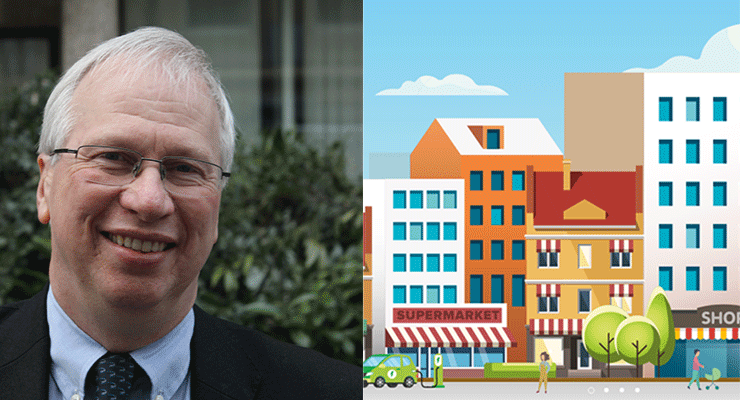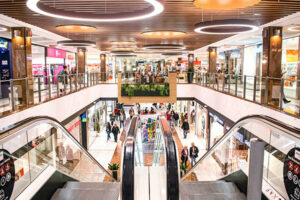ACROSS: As a European organization, how would you describe the state of retail in summer 2022?
Neil McMillan: We have been working with McKinsey on an annual State of Grocery Retail report for the past two years and have recently produced the 2022 edition. As the title “The State of Grocery Retail 2022” suggests, our industry has had to contend with a number of headwinds –nearly two years of COVID-19 disruption, which caused bottlenecks in some of our supply chains and meant that many non-food shops and wholesalers supplying the hospitality industry suffered greatly, the effects of which are still being felt. The timing of the research for the joint McKinsey/EuroCommerce report meant that the impact of the Russian invasion of Ukraine was only partially covered. At the same time, we are seeing the sector undergo a massive transformation – in the area of digitalization, accelerated by the COVID-19 lockdowns, in the area of sustainability through growing consumer demand for more sustainable products sold sustainably, accompanied by legislative pressure to address the environmental impact of waste, for example, and the transition to a circular economy. Inflation had already started to put pressure on consumers prior to the invasion of Ukraine, and it has now reached historically high levels.
ACROSS: Inflation and falling consumer confidence are making headlines. How bad is it for retailers, and are they passing on the higher prices?
McMillan: Inflation is never good news for retailers. In the present situation, in which inflation is putting immense pressure on consumer purchasing power, retail is being squeezed from a number of directions – we have to pay very high energy prices to keep our operations running, whether it is refrigeration, heating, air conditioning, or logistics. In addition, the Russian blockade of Black Sea ports has led to an increase in the price of fertilizers, wheat, corn, and oils, which, in turn, not only affects the products that use those ingredients, but impacts the farmers who use those products as feed for animals and for their own crops. Across Europe, we are seeing consumers respond by trading down – entry-level own-brand products and even buying less of those due to the squeeze they are feeling on their wallets. In addition, there are suppliers, particularly big brands, seeking higher price increases than are justified by the increase in their input costs. We are aware of those costs, because we receive direct information from the suppliers of our own brands. Our sector is doing everything that it can to protect consumers from the worst effects of those price increases, but with net margins in food hovering around 1-3%, there is only so much we can do before we have to pass at least some of the costs in the prices we charge. We hope that big brands, whose net margins range between 15% and 30%, will also recognize the need to use some of that cushion to help consumers. What we have heard from the ECB and analysts suggests that the issue of inflation will be with us for some time to come.
ACROSS: What are the main differences between the countries and regions in Europe?
McMillan: Inflation has hit the countries in Central and Eastern Europe the hardest, as well as in Southern Europe, where household incomes are already below those of Northern and Western European countries. As a result, consumers there are suffering significantly. We have seen the beginning of this inflationary pressure lead to higher wage demands, and that is why we have called on European governments to help consumers and companies offset some of the energy costs, which economists point to as one of the major drivers of inflation. That would go a long way toward helping to prevent an ever-escalating price-wage inflationary spiral. However, there is more that Europe can do to curb inflationary trends. When it comes to making the economy more competitive and curbing prices, Europe’s secret weapon is the single market – yet we see governments taking a beggar-my-neighbor approach, imposing new barriers and blocking the massive potential of a well-functioning internal market that drives growth and recovery. Moreover, it is not just governments: A commission report released two years ago examined so-called territorial supply constraints, in which particularly large brand-name manufacturers fragment the single market by insisting that retailers buy exclusively from their national distributors. That has led to portions of their ranges being unavailable in some countries and the wholesale price paid by retailers varying considerably from country to country, affecting smaller markets in particular. In a report from two years ago, the commission estimated that such constraints cost European consumers some 14 billion euros a year in unjustified price differences between markets. That often means that prices in low-income markets may actually be higher than in larger, higher-income countries.
ACROSS: A major challenge for many European retailers is the shortage of workers, especially since the outbreak of the coronavirus. Why has retail become less attractive to employees? How can retailers rise to the challenge, and can technology help?
McMillan: I do not think that retail and wholesale have been affected more than other sectors or have lost attractiveness – there are 26 million Europeans working in our sector in very diverse and rewarding jobs. The onset of COVID-19 had wide-ranging impact on different sectors: In some, it meant that many people working abroad had to return to their home countries, and many of them then ended up staying. Others found that the disruption to their normal work patterns led them to seek other work patterns or lifestyles. Earlier, I mentioned the dual transformation of digitalization and sustainability, but an equally important transformation has occurred with respect to how we attract and retain talent and meet the very different needs of new business models driven by digital technology and sustainability. Greater automation and sophisticated technologies in warehouses and stores will lead to people moving away from routine tasks that can be taken over by machines. More people with IT skills will be needed – an area in which the shortage is already acute across all sectors. The annual output of IT specialists in Europe is only a small fraction of what we see in China and other Asian countries, and if Europe wants to be competitive, governments as well as educational systems must do more to respond to this urgent need. However, businesses also need people who are able to deal with sophisticated systems that use, for example, AI and techniques such as blockchain. We need to train our existing staff to be able to handle such things – and I am optimistic that most of them will be able to do so. The shift to omnichannel, whereby customers use diverse combinations of online and in-store purchasing, will see more people being deployed to interesting jobs – developing the expertise to advise customers on the best products and using soft skills to make the customer experience one that brings them back to shop once again. As a result, many routine tasks will be taken over by technology, and the innate talents of our employees can be used to a greater extent.
ACROSS: The 2022 European E-commerce Report has recently been published. What are the key findings?
McMillan: We published the report in June together with our close partner Ecommerce Europe. In 2021, European e-commerce grew by 13 % to 718 billion euros. While the growth rate remained stable, it still slightly increased compared to 2020. This was not surprising, as the peak of e-commerce growth was obviously accelerated by the COVID-19 lockdowns and the fact that people began ordering much more food online than before. However, online sales have continued to grow, even following the lifting of the lockdowns and the return of consumers’ ability to visit physical stores. The report identified two trends. On the one hand, as mentioned, the normalization and stabilization of sales compared to the exceptional previous year and the steady growth predicted this year are of note. On the other hand, the report shows that consumers are being more careful in terms of their spending. The effects of the war in Ukraine, inflation, disrupted global supply chains, and a general feeling of uncertainty are causing growth figures to return to pre-pandemic levels. Additionally, the online services industry, which includes e-tourism, events, and ticketing, has experienced a steady recovery over the past year. Through it all, fair competition will be an important element when it comes to driving European competitiveness in the online market.
ACROSS: The image of e-commerce as the enemy has increasingly disappeared as a result of strong growth. In your experience, what important fundamentals are key to the harmonization of brick-and-mortar retail and e-commerce?
McMillan: As I mentioned earlier, omnichannel and consumer demand for a seamless shopping experience – getting what they want where and when they want it – means that the distinction between online and offline retail has become increasingly blurred, and that will continue to be the case. People will buy online and collect in store, buy in store but receive delivery at home, and many other variations along those lines. What is needed is a clear focus on customer expectations and the design of retail offerings that meet those expectations. That is neither new nor complex – it is what retailers and wholesalers have been doing for decades, if not centuries – responding to and anticipating what their customers want. What has changed is the pace of that change, and there is no indication that it will slow down anytime soon.
ACROSS: What do you see as the biggest challenges for the rest of the year? What should be on every retailer’s to-do list, and how can governments help?
McMillan: The retail and wholesale sectors will need to continue to invest in digital, sustainability, and their people. We estimate that our sector will need to double its investment over the next decade in order to remain competitive and face potential challengers, such as those from China and the Far East, and to continue to meet customer expectations. One immediate challenge involves reducing our dependence on expensive (and imported) fossil fuels, in other words, powering our premises, making them more energy efficient, and switching to alternative fuels in the area of logistics.

Neil McMillan is Senior Counsellor, Political Affairs & Strategy, Director, Advocacy and Trade at EuroCommerce







